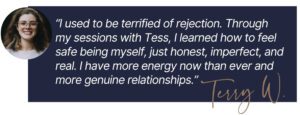The antidote to feeling left out starts within you.
Feeling left out hurts because it pokes at the fear that we won’t be chosen, loved, or included. But real belonging doesn’t come from being accepted by others, it begins when you feel safe and at home inside yourself.
Which one means belonging to you?
-
Feeling comfortable in relationships while still being distinct in your uniqueness?
-
Feeling seen and accepted by everyone around you?
Most people choose #2—but that’s the one that leads to pain. Because when belonging depends on approval, you’re always waiting for permission to be yourself.
When you trust yourself, your nervous system stops scanning for rejection. You naturally become easier in connection and paradoxically, people feel more drawn to you.
Below are seven ways to start creating belonging from the inside out.
Table of Contents
1. Know Thyself

Getting to know yourself is the foundation of trust and genuine belonging.
“You can’t trust someone you don’t know, and that includes you.”
Most of us don’t realize how rarely we truly hear our own inner voice. Beneath all the noise is a subtle hum of a voice in you that wants your attention.
Spend quiet time each day listening to your thoughts and sensations instead of scrolling or comparing. Notice how your body feels when you accept yourself versus when you’re trying to impress.
When you slow down enough to listen, you may notice tension, restlessness, or even emptiness. Don’t rush to fix it. This is your body showing you where belonging got interrupted.
Feeling left out | Practical ways to start:
-
Take ten minutes to journal without editing. Write what’s on your mind, not what sounds wise.
-
Sit in stillness and simply listen: “What am I needing right now?”
-
Treat your inner world like a friend you’re curious about.
These sources of connection retrain your nervous system to feel safe being with yourself. That’s where belonging begins; inside the space you create for your own presence. Every time you do, you teach your nervous system: My voice matters.
2. The Crowd’s Approval

Approval-seeking often hides a longing to feel safe not a need to belong.
“Approval-seeking is often a safety pattern, not from feeling left out.”
Watch how many moments in your day revolve around being liked. “Did I sound weird?” “What did they think?” Each thought is a small request for something trying to get your attention.
The assumption is that when you are accepted by others, that voice will reduce. But seeking approval outside of you makes the voice of scarcity louder.
The truth is that voice of insecurity wants you to pay attention to it and hear it. You are the one who’s approval it seeks.
When Feeling left out, Ask yourself:
-
What does “being accepted” really mean to me?
-
What am I afraid would happen if someone disapproved?
Give that voice a place to be heard and met. Offer to it what you think you need others to give it. Really breathe in the feeling that comes when you meet it with acceptance.
Instead of disapproval or trying to change to get approval elsewhere, the approval that voice/pattern seeks is within – it’s been there all along.
A reframe:
- “My worth isn’t up for debate.”
- “It’s right here in me.”
When you approve of yourself first, your relationships stop feeling like auditions. You can create connection without loosing yourself and authentically connect without seeking something more.
More Belonging Awaits
The Joy Reset: Micro-Moments That Change Your Day.
It’s a short, soulful guide to help you rediscover connection and belonging through daily, sensory moments of joy.
✦ Let’s Begin My Joy Reset ✦ →
3. Learn to Approve of Yourself

Approving of yourself helps your nervous system relax into genuine self-worth.
“Your approval is the only one you can count on.”
Overanalysing how others see you, when you seek reassurance, it’s often a younger part of you asking: Am I good enough yet?
Instead of dismissing it, try turning toward it. That small voice isn’t wrong, it’s young. It’s asking for attunement, not evidence.
Pick one decision that you usually seek reassurance for. Write it down and consciously affirm, “I decide this matters because I value it.” Decision-making gets easier when you trust your preferences.
This simple act trains your body to associate self-direction with safety. Over time, external validation loses its grip, and confidence becomes quieter but more stable.
Helpful exercise:
-
Write your idea.
-
Name three reasons it aligns with your values.
-
Take one small action today based solely on your approval.
Writing your thoughts down helps integrate this moment; it brings the emotional brain and the cognitive brain into alignment. This is how internal approval becomes embodied confidence.
4. Stop Asking Permission to Exist

You don’t need permission to exist, the world wants your authentic presence.
Permission-seeking keeps belonging out of reach.
Try something new: post that thought online, wear the yellow suit, speak up in the meeting, without checking if anyone else thinks it’s okay. It will feel uncomfortable at first, but that discomfort isn’t wrong; it’s your nervous system adjusting to authenticity.
The world needs your real presence, all of the voice, quirks and energy that only you bring.
When you stop editing yourself for acceptance, you make space for the kind of connection that’s real and alive.
Every time you act without asking for approval, you strengthen the part of you that already belongs. That’s how confidence grows not from being louder, but from being truer.
Try this:
-
Notice the small places you shrink: an opinion held back, a joke swallowed, a colour you love but never wear.
-
Let one of those parts out today, just a little.
-
Afterwards, pause and breathe. Feel how your body softens when you don’t need to apologize for existing.
You don’t earn belonging by shrinking. You embody it when you show up as yourself.
5. Don’t Assume the Negative

When you assume the best, your body can express it’s best.
“Your body is free when you focus on beauty and love.”
When your brain predicts threat faster than safety, it’s trying to protect you from pain and old rejection feelings resurfacing.
When you catch yourself assuming others judge you, pause before believing the story. Feel your feet on the ground. Let your exhale lengthen.
Now add something beautiful. An object or memory that lights you up.
These actions send signals to your body: I’m not in danger right now.
Feeling left out | Somatic re-centering:
-
Breathe in through the nose for four counts, exhale slowly for six.
-
Let your shoulders soften and your gaze widen, literally look around the room.
This orienting response reminds your system you’re safe in the present and you are part of this world and belong here.
You come out of an old story of exclusion and start to see where you already belong.
Over time, choosing curiosity instead of fear becomes your new baseline. It’s not about positive thinking; it’s about helping your body remember safety and joy in real time.
From Insight to Action
Belonging begins with one choice: trusting your own voice.
When we second-guessing ourselves and waiting for approval interrupts the full life we could live: it’s time for support that helps you choose you.
✦ Start Belonging From Within ✦ →
6. Apologize Less, Express More

Express yourself with ease and see how belonging grows when you let joy move.
“…existing openly isn’t dangerous; it creates connection.”
Notice how often you say “sorry” when what you really mean is thank you or excuse me. It’s a subtle reflex asking, Is it still safe for me to be here?
Instead of policing your language, start by meeting the feeling underneath. Usually, it’s the child part of you who once learned that shrinking or smoothing things over kept you safe. Now, that part needs your adult reassurance: You’re allowed to take up space.
Try this small shift:
-
When you catch yourself saying “sorry,” pause. Ask, Did I do something wrong, or am I afraid of being left or disapproval?
-
If it’s the latter, change the phrase to gratitude “Thanks for waiting,” or “I appreciate your patience.”
-
Breathe. Let your shoulders relax as you say it. Feel the difference in your body when you speak from the calm presence of knowing you are enough.
This subtle shift replaces shame with gratitude and retrains your body to expect acceptance instead of exile.
Track how often you apologise for existing and let silence fill the gap instead. That’s what self-respect sounds like. You teach yourself that existing openly isn’t dangerous; it creates connection.
7. Being Brave and Chill

Confidence doesn’t mean pushing harder. You can be soft while showing up as yourself.
Confidence isn’t loud, it’s relaxed.
Share your ideas even when they might not land perfectly. When feedback comes, breathe and remember disagreement isn’t danger. Your calm presence teaches your system: I can stay regulated even when someone sees differently.
Being brave doesn’t mean pushing harder; it means showing up honestly, even when you feel wobbly. Your system might expect rejection, but calm courage tells it: We can be seen and stay safe.
When you share your ideas, your truth, or your humour, do it for the satisfaction of being real, not for approval. Let the conversation unfold. If feedback comes, breathe first; reply later. That pause is power.
Feeling left out | Grounded practice:
-
Before you speak, take a slow exhale and feel your feet.
-
Remember: you’re not performing — you’re participating.
-
Afterwards, notice how your body feels when you stay relaxed while still being yourself.
Confidence is quiet steadiness. It’s the energy that says, I belong here because I’m here.
The world doesn’t need polished perfection; it needs your calm, authentic presence. When you meet life this way, even disagreement can feel like dialogue instead of danger.
Worth from Within

When your worth comes from within, joy stops waiting for permission.
When belonging lives inside you, loneliness softens. You don’t have to perform you can just be.
Your presence was never meant to blend in but to resonate with the ones who are like you.
Acceptance is already here and it is safe to try embodying self-trust. When you do, the world begins to meet you differently, because you’re loving yourself authentically.
Feeling left out |When Our Worth Comes from Within:
-
Other people’s opinions no longer threaten your value.
-
Your emotions feel manageable instead of overwhelming.
-
Safety comes from your body, not from someone’s approval.
-
You stop asking, “Do they like me?” and start asking, “Do I like how I showed up?”
The world doesn’t need your perfection, it needs your authentic presence. That’s what people connect to, and what quietly invites belonging wherever you go.
When belonging lives inside you, the loneliness softens. You don’t have to perform. You can finally just be.
Frequently Asked Questions | feeling left out
Q1. Why do I feel left out even with close friends?
Because belonging is an inner state, not a social one. When your self-trust wavers, your body keeps scanning for exclusion—even among people who love you.
Q2. How can I stop comparing myself to others?
Notice the moment comparison starts and gently redirect: “Their path isn’t mine.” Then anchor back into your breath or your body.
Q3. Can therapy or coaching help with belonging wounds?
Yes. A therapeutic coach helps you regulate the body’s threat response and build self-trust so relationships feel easier and safer.
Q4. What’s one quick way to feel included again?
Move your body: walk, stretch, or breathe slowly. Reconnecting physically signals safety faster than any thought can.

